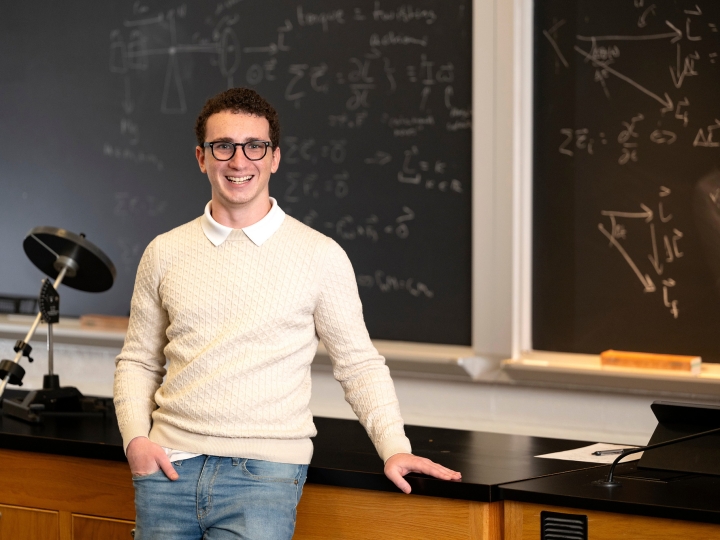
Bethany Fitch ’23, Theatre and Environmental Studies
December 10, 2020
It wasn't until she arrived at Bucknell as a Presidential Fellow that Bethany Fitch '23 discovered ways to marry theatre with her deep interest in the climate crisis. Photo by Emily Paine, Communications
I truly believe one of the best ways to change the world is through art. I never imagined I could actually pair my enthusiasm for climate action with a major in theatre until I came to Bucknell.
It's no secret that combatting the unpredictable effects of climate change will require creative solutions devised by scientists and engineers eager to push the boundaries of innovation. But Bethany Fitch '23 believes that experts aren't the only ones capable of producing meaningful change. At Bucknell, she's using her double major in theatre and environmental studies to inspire local communities to consider their role.
"Art is such an important means of promoting change through the power of storytelling," Fitch says. "It's a gateway into people's hearts, where the right story with a meaningful message can encourage them to take action."
Since first taking the stage in elementary school plays, the Maryland native has nurtured a lifelong passion for performance. But it wasn't until she arrived at Bucknell as a Presidential Fellow that Fitch discovered ways to marry theatre with her deep interest in the climate crisis. Now, she's partnering with environmental studies & sciences professor Andrew Stuhl on a research and storytelling project surrounding the impact of Hurricane Agnes, a storm that caused devastating flooding throughout Central Pennsylvania in summer 1972.
Noted as the nation's most costly natural disaster at the time, Agnes caused the Susquehanna River to swell more than 15 feet above flood stage, submerging cities and towns in up to 650 billion gallons of water. Seventy thousand homes and businesses were destroyed, resulting in $2 billion in damage.
"It was a huge 'before and after' moment for this area that shapes so many people's lives and memories to this day," says Fitch, who tapped into that well of history this fall by conducting interviews with residents who lived through Agnes.
Every week, Fitch met virtually with Central Pennsylvanians to collect their experiences and recollections of the flood. Many of them, she says, were children or teens in the early '70s and "interestingly remember it more as this big adventure as opposed to a large-scale tragedy." Some even managed to draw lifelong inspiration from the emergency, like one woman whose experience providing aid to neighbors at age 12 led to her future career as a paramedic. But for others, the catastrophe marks the ultimate example of extreme weather events that stand to become more and more common without effective tools for fighting climate change.

Bethany Fitch '23 is tapping into a well of local history by conducting interviews with Pennsylvanians who lived through Hurricane Agnes. Photo by Emily Paine, Communications
Soon, Fitch will work with Stuhl to transform these stories into a series of performance workshops for the spring 2021 semester, culminating in a community theatre event in collaboration with the Bucknell Humanities Center's storyteller-in-residence. The workshops are a continuation of a yearlong series called "Learning to Live with Floods: Histories, Change, Remembrance, and Resilience," an interdisciplinary exploration of hurricanes, extreme rains and other violent storms.
Throughout the fall, Fitch helped produce online events ranging from an interactive lecture on narrative writing to a storytelling forum featuring local residents and Bucknell students sharing their experiences with floods — both literal and emotional.
Creating avenues like these for reflection "not only bonds communities together but also provides spaces for examining the dramatic shifts we're experiencing in our world right now," Fitch says. "Environmental justice and theatre don't seem like an obvious combination, but it's so cool that this project is allowing me and so many others to make these personal stories part of the broader conversation."

